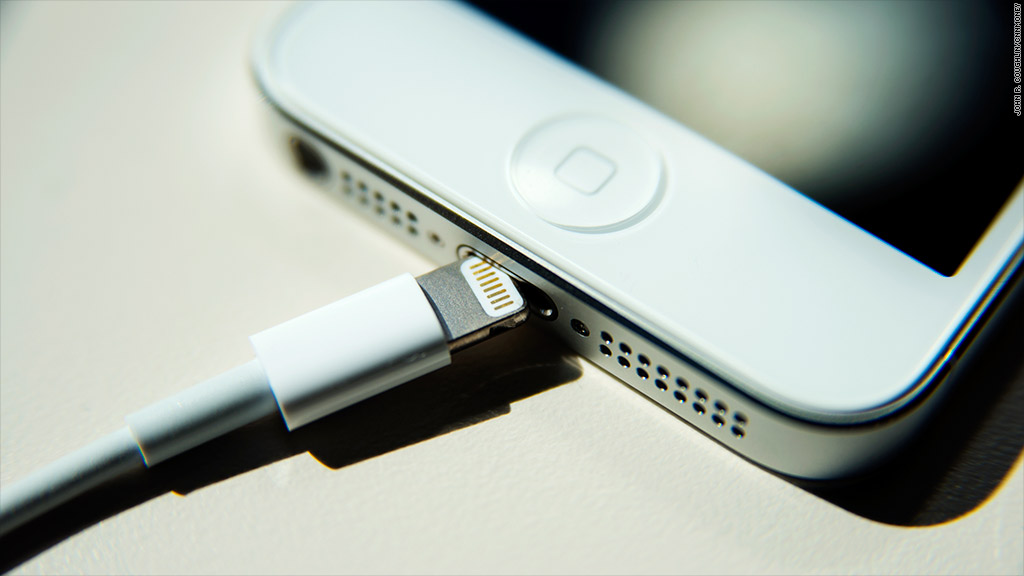
Apple's pricey iPhone chargers have traditionally been the target of a thriving black market, with knockoff versions of the easy-to-copy cables available online for mere pennies. That could stop with the iPhone 5, which includes a new connector that's much, much harder to fake.
When Apple (AAPL) announced and released the iPhone 5 last month, it ditched the so-called 30-pin connector it used for almost a decade for a smaller, 8-prong setup dubbed "Lightning." The smaller size wasn't the only change.
The operator of Double Helix Cables, an online cable shop, tore apart the Lightning connector just after the iPhone 5's release -- and discovered a chip that wasn't included in the 30-pin version. His findings, which were first published on the blog AppleInsider, revealed that the intricate architecture of the new cables makes them difficult to rip off. That's in stark contrast to the simple and often-copied 30-pin connector.
A source with knowledge of Apple's manufacturing confirmed that the Lightning connector does have an authentication chip, and the 30-pin does not.
The Double Helix Cables owner (who asked that his name not be used) told CNNMoney that the new chip sits in the path of the Lightning's power wire -- making the setup "much more complex" than that of the 30-pin connector.
"Chinese manufacturers are currently working to clone this new connector -- but they cannot do it with the same ease and low cost as before, I don't think," he said.
Apple runs a "Made for iPhone" licensing program (better known as "MFi") for third parties that want to make legitimate accessories, and many manufacturers work with Apple to certify their products. Still, cheap knockoffs are prevalent.
An official version of Apple's old 30-pin to USB connector cable, for example, costs $19 in the Apple Store. On eBay, you can buy similar cables from Asian manufacturers for mere pennies -- free shipping included. (An eBay spokeswoman said the company "has zero tolerance for criminal activity on its platforms; counterfeits and stolen items are illegal and not welcome on any of its sites.")
Don't expect those kinds of rock-bottom prices for third-party versions of Apple's Lightning accessories, which range in price from $19 (for a Lightning-to-USB cable) to $39 (for a Lightning-to-30-pin adapter with a cord).
Several apparent Lightning knockoffs have already appeared on sites like Amazon (AMZN) and eBay (EBAY), but they're listed as pre-sale or "currently unavailable" -- meaning they probably don't exist yet.
Most sellers advertising cut-price Lightning accessories use generic names, don't have websites, and don't make their contact information available. CNNMoney's attempt to reach iTronz, a seller with Amazon listings, went unanswered.
It will likely take months for counterfeit companies to develop working cables, the Double Helix owner believes.
"Unlicensed knockoffs are going to happen eventually, but now there is even more of a reason to just use Apple's cable -- the circuitry is much more complex now and so there is a lot more to go wrong," he said.
Related story: You'll need a $30 adapter to link iPhone 5 to old gadgets
If those knockoffs do hit the market, they may not be much cheaper than the real thing. The 30-pin dock cables are worth about 30 cents wholesale, he estimates, but he predicts that the Lightning connector will cost $3 to $8 at wholesale prices.
John Brownlee, a deputy editor at Cult of Mac who closely tracks Apple's adapters, told CNNMoney he thinks Apple "currently only legally pursues unlicensed 30-pin dock connectors if they are a business of a certain size." He expects that to change with Lightning. An Apple representative declined to comment on the issue.
"Apple will crack down pretty hard on anyone it can who tries to rip off Lightning," Brownlee predicts. He thinks Apple will try to create a significant revenue stream from signing third-party licensing deals for Lightning accessories.
In any case, the old crank-'em-out model for black market Apple cables will no longer work.
"Lightning's sophistication should make it a lot harder for anyone to make a Lightning connector without paying a licensing fee," Brownlee said. "Which is, of course, by design."

